
Karen Willcox
Director, Oden Institute for Computational Engineering and Sciences
University of Texas at Austin
Model reduction methods have grown from the computational science community, with a
focus on reducing high-dimensional models that arise from physics-based modeling,
whereas machine learning has grown from the computer science community, with a focus
on creating expressive models from black-box data streams. Yet recent years have seen
an increased blending of the two perspectives and a recognition of the associated
opportunities.
This talk presents our work in operator inference, where we learn effective reduced-order operators directly from data. The physical governing equations define the form of the model we should seek to learn. Thus, rather than learn a generic approximation with weak enforcement of the physics, we learn low-dimensional operators whose structure is defined by the physics. This perspective provides new opportunities to learn from data through the lens of physics-based models and contributes to the foundations of Scientific Machine Learning, yielding a new class of flexible data-driven methods that support high-consequence decision-making under uncertainty for physical systems.